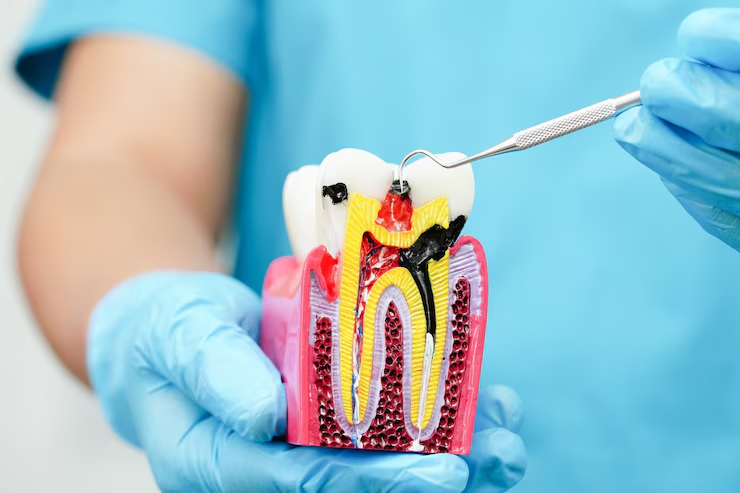
The purpose of root canal therapy is to protect teeth from serious decay or infection.
However, what if the very treatment intended to restore your tooth really makes matters worse?
It is true that a root canal infection may recur following treatment, but don’t worry—we have you covered. This blog has all the information you need to understand why it occurs, how to recognize the symptoms, and—most importantly—what you should do to safeguard your teeth and end the bothersome discomfort.
What Exactly is a Root Canal?
Before getting into the discussion of infections, let’s quickly review what a root canal is. In order to stop additional decay, a root canal is a dental procedure that removes the diseased or injured pulp or soft tissue inside the tooth. After that, the area is cleared of debris, cleansed, and sealed to prevent the extraction of your teeth. Quite easy, huh? However, things don’t always go as planned.
Can a Root Canal Get Infected?
Unfortunately, yes. While root canals have a high success rate, infections can happen even after treatment. This can be due to several reasons:
- Inadequate Cleaning: If germs are left inside the tooth after it hasn’t been fully cleansed.
- Reinfection: Bacteria may re-enter a tooth through fissures, new decay, or damage to the crown.
- Compromised Seal: Bacteria may be able to re-enter the treated region if there is a weak seal or a delayed crown implantation.
So, what do you do when you suspect your root canal is infected? Let’s break it down.
Signs of a Root Canal Infection
You just had your root canal, but something feels off. Here are some red flags that might indicate an infection:
- Persistent Pain: There may be an issue if you feel throbbing or continuous pain in the treated tooth.
- Swelling or Tenderness: An infection is indicated by noticeable swelling in your face, neck, or surrounding your teeth.
- Bad Taste or Odor: If the treated tooth has a bad taste or smell, there may be pus from an infection.
- Fever or General Malaise: A fever or sickness may be a sign of a spreading infection.
- A pimple on the gums: This, in many cases, is a classic indicator of infection. It is also referred to as a dental abscess and appears close to the treated tooth.
If you’re facing any of these symptoms, it’s time to take action!
Immediate Steps to Take If Your Root Canal Gets Infected
If you suspect an infection after your root canal, don’t panic! Here’s what to do to get ahead of the problem:
- Speak with Your Dentist Right Away: Make a call to your dentist as soon as possible. They can ask you about your symptoms and request that you come in for a check-up. Act immediately to stop the virus from spreading.
- Handle Pain at Home: Over-the-counter analgesics such as acetaminophen or ibuprofen can help reduce pain while you wait for your appointment. To avoid aggravating the infection, refrain from chewing on the affected side.
- Warm saltwater rinses: This can be used to reduce inflammation and extract certain microorganisms. In a cup of warm water, dissolve half a teaspoon of salt and swish it about your mouth.
- Eat Nothing Hot or Cold: Eat only room temperature food until you see your dentist because extreme temperatures can exacerbate the infected tooth.
How do Dentists Treat a Root Canal Infection?
If your root canal has become reinfected, your dentist may recommend one of the following treatments to save your tooth:
- Retreatment: The dentist will frequently carry out a root canal retreatment. This entails cleaning the tooth once more, opening it again, and correctly resealing it. Consider it an opportunity to make things right again.
- Apicoectomy: Your dentist might recommend an apicoectomy if retreatment is insufficient. During this process, the contaminated tissue and the tip of the tooth’s root are removed. If there is an infection at the very tip of the root canal, it is typically done.
- Tooth Extraction: In extremely rare situations where the infection is severe and untreatable, extraction of the tooth may be the only course of action. But don’t worry, your dentist will talk you through all the options and choose what’s best for you.
How to Prevent a Root Canal from Getting Infected Again?
Once you’ve gone through treatment, it’s crucial to take care of your tooth and prevent reinfection. Here’s how:
- Maintain Good Oral Hygiene: Use an antiseptic mouthwash, floss frequently, and brush twice a day to keep bacteria at bay.
- Frequent Dental Checkups: See your dentist for cleanings and exams on a regular basis. They can ensure that your root canal is holding up well and identify any problems early.
- Protect Your Teeth: Use a mouthguard to prevent injuries if you participate in contact sports. To stop cracks, also refrain from biting on hard materials like ice, pencils, etc.
When to Seek Emergency Help?
Severe swelling, trouble breathing, or a very high fever could indicate that the infection is extending outside of your tooth. In these situations, they need emergency medical attention or dental care right away. Don’t wait; an illness left untreated might cause major health issues.
Although a root canal infection can be upsetting, your tooth is still salvageable. With the appropriate care and timely attention, you can quickly return to smiling without discomfort. After receiving a root canal, if you notice any symptoms of infection, get in touch with your dentist and take the appropriate action to safeguard your oral health. You can make sure your root canal saves your tooth and maintains the strength of your smile by taking preventative measures!
